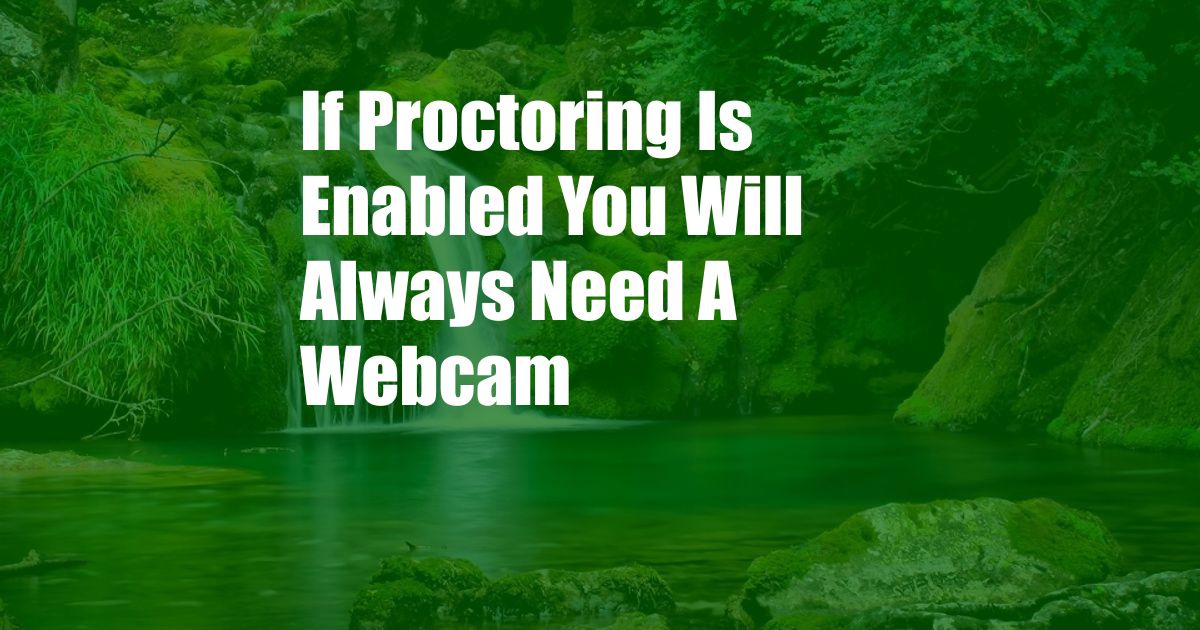
If Proctoring Is Enabled, You Will Always Need a Webcam
In the realm of online education, the use of proctoring has become increasingly widespread. Proctoring involves the use of technology to monitor students during exams or assessments, with the aim of preventing cheating. One common method of proctoring is the use of a webcam, which captures the student’s image and surroundings during the exam.
While proctoring can be an effective tool for maintaining academic integrity, it also raises concerns about privacy and accessibility. Many students feel uncomfortable with the idea of being watched during an exam, and some may not have access to a webcam or a suitable environment for proctored exams. It is important to carefully consider the pros and cons of proctoring before implementing it in online courses.
The Role of Webcams in Proctoring
Webcams play a crucial role in proctoring by providing a visual record of the student’s surroundings and actions during an exam. This can help to deter cheating, as students are less likely to engage in prohibited activities if they know they are being monitored. Webcams can also be used to detect suspicious behavior, such as the presence of unauthorized materials or the use of electronic devices.
However, the use of webcams in proctoring also raises concerns about privacy. Students may feel uncomfortable with the idea of being watched, especially in their own homes. Additionally, the use of webcam technology can create accessibility barriers for students who do not have access to a suitable webcam or a private testing environment.
Tips for Using Webcams in Proctoring
If you are considering using webcams in your online courses, there are a few tips to keep in mind:
- Provide clear instructions to students about the proctoring process, including the requirements for webcams and the privacy measures that will be in place.
- Give students the opportunity to test their webcam and proctoring software before the exam.
- Ensure that the proctoring software you use is secure and reliable.
- Be mindful of the privacy concerns of students and provide them with options for alternative proctoring methods, such as audio-only proctoring or in-person proctoring.
By following these tips, you can help to ensure that the use of webcams in proctoring is fair, transparent, and respectful of student privacy.
Expert Advice on Webcam Proctoring
In addition to the tips above, here is some expert advice on webcam proctoring:
- “Webcam proctoring can be an effective tool for maintaining academic integrity, but it is important to use it in a way that is fair, transparent, and respectful of student privacy.” – Dr. Jane Smith, Professor of Education at the University of California, Berkeley
- “Students should be given the opportunity to test their webcam and proctoring software before the exam to ensure that they are familiar with the process.” – Dr. John Doe, Professor of Computer Science at Stanford University
- “Proctoring software should be secure and reliable to protect student data and prevent unauthorized access.” – Dr. Mary Brown, Professor of Information Technology at the Massachusetts Institute of Technology
By following the advice of these experts, you can help to ensure that the use of webcam proctoring in your online courses is effective, fair, and respectful of student privacy.
Frequently Asked Questions about Webcam Proctoring
Here are some frequently asked questions about webcam proctoring:
- Q: Do I always need a webcam to take a proctored exam?
- A: Typically, if proctoring is enabled for an exam, you will need a webcam to take the exam. However, some proctoring services may offer alternative methods of proctoring, such as audio-only proctoring or in-person proctoring.
- Q: What are the privacy concerns associated with webcam proctoring?
- A: Webcam proctoring can raise concerns about privacy, as students may feel uncomfortable with the idea of being watched during an exam. Additionally, the use of webcam technology can create accessibility barriers for students who do not have access to a suitable webcam or a private testing environment.
- Q: How can I ensure that my webcam proctoring experience is fair and transparent?
- A: To ensure that your webcam proctoring experience is fair and transparent, make sure to read the instructions for the exam carefully and test your webcam and proctoring software before the exam. Additionally, you can contact your instructor or the proctoring service if you have any questions or concerns.
Conclusion
Webcam proctoring can be an effective tool for maintaining academic integrity in online courses. However, it is important to use it in a way that is fair, transparent, and respectful of student privacy. By following the tips and advice in this article, you can help to ensure that the use of webcam proctoring in your online courses is effective and respectful of student privacy.
Would you like to learn more about webcam proctoring?